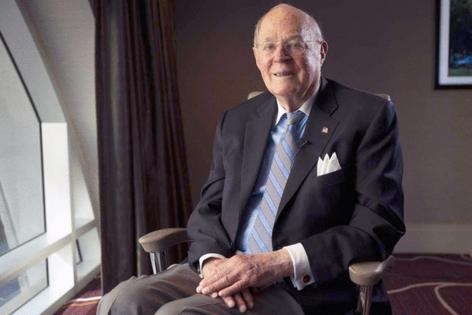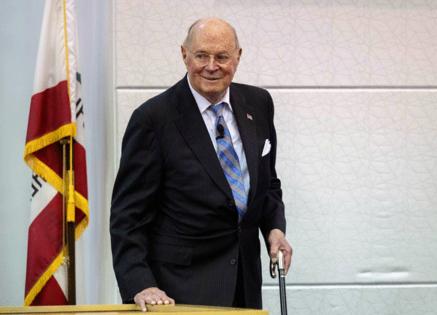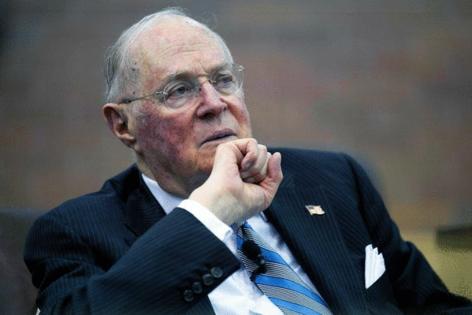Retired Supreme Court Justice Kennedy reflects on cases, politics, his California boyhood
Published in Books News
SACRAMENTO, Calif. — The conservative jurist whose powerful belief in individual liberty shaped some of most influential U.S. Supreme Court rulings of the past 40 years has blue eyes that flash and sparkle as he looks at you, and a life story that outlines the history, culture and politics of Sacramento, his beloved hometown.
Also, Anthony M. Kennedy, the last U.S. Supreme Court Justice to be unanimously confirmed by the Senate, does a mean imitation of the guy who tapped him for the court, former U.S. President and California Gov. Ronald Reagan.
Now 89, the old-school California Republican has written a memoir, “Life, Law & Liberty.” It starts with his childhood in Land Park and ranges through his years as a lawyer, law professor and judge, explaining the judicial philosophy that defined him as a strong yet moderating voice on the court and a key vote behind decisions that legalized same-sex marriage, protected free speech rights and ended the death penalty for minors.
The publication of his book brought him back to Sacramento on a lecture tour that included a stop at University of the Pacific’s McGeorge School of Law, where he was the longest-serving professor.
In a rare interview, he sat down with a reporter from The Sacramento Bee to reflect on his life and career.
Childhood
Kennedy was born in 1936, to Anthony James Kennedy, a lawyer and lobbyist, and Gladys McLeod Kennedy, a teacher who also had worked as an aide at the Capitol. They lived on Sixth Avenue before moving to a house on East Lincoln Avenue in Land Park when the future justice was 5.
His sister Nancy’s best friend was the budding writer Joan Didion — the two girls met as 5-year-olds in ballet class — and the kids sometimes got to go swimming at the home of members of the McClatchy family, owners of The Sacramento Bee, because they had a pool.
One of young Anthony’s closest friends was a boy who was of Japanese descent. The two played together, sometimes every day. The boy, Naoki, had a treasured toy, a samurai doll dressed in beautiful silk.
Kennedy knew about the Second World War and the Japanese bombing of Pearl Harbor, because the attack took place on the very day that the family had moved to their new home in Land Park. But he wasn’t prepared for what happened to his friend, as the United States government began in 1942 to send Japanese Americans to internment camps.
“One day he came knocking on the door, and he gave me this samurai warrior with tears in his eyes, because he was being relocated,” Kennedy recalled. “I never saw him again.”
That experience, along with his father’s staunch opposition to the removals, helped form Kennedy’s powerful belief in the equality of all people and the importance of preserving and protecting individual rights.
“Sacramento,” he says in the book, “is where my thinking began about equality, liberty and freedom.”
Life and law
Kennedy attended Stanford University, graduating with honors in political science in 1958 after a stint studying abroad at the London School of Economics. He attended Harvard Law School (he says as a way to check out life on the East Coast) before returning to California to practice law in San Francisco.
In 1961, Kennedy crossed paths with Mary Davis, a family friend from Sacramento who was studying for a master’s degree at Stanford, and two years later they were married at Sacramento’s Sacred Heart Catholic Church. Soon after, Kennedy’s father died unexpectedly of a heart attack, and the couple moved back to Sacramento, where the young lawyer took over his father’s practice and they raised three children.
Brought into the fold by judges and lawyers who knew his father, Kennedy was soon asked to develop and teach courses on constitutional law at University of the Pacific’s McGeorge School of Law, where he taught for more than 50 years in Oak Park and at the school’s international program in Austria. In 1975, he became the youngest federal appeals judge in the country when President Gerald Ford nominated him to the 9th Circuit Court of Appeals.
In 1987, Kennedy was attending a Sacramento Kings game when someone came rushing up, saying there was an urgent phone call for him.
“It was Ed Meese,” he said, referring to the U.S. Attorney General under then-President Reagan. “He said, ‘You have to come to Washington right away.’”
The president was in urgent need of a new Supreme Court justice whose nomination could win approval from a fractured U.S. Senate. Reagan’s previous two choice to replace the retired Justice Lewis Powell, Robert Bork and Douglas Ginsburg, had not been successful.
Kennedy was honored but skeptical. “I have to get some sleep first,” he told Meese.
And then, when he was actually in Reagan’s office to talk about the job, Kennedy told Reagan, whom he knew from California government and politics, that he didn’t want to leave Sacramento.
“We don’t know anybody in Washington, D.C.,” he told the president.
Here Kennedy’s eyes lit up and he leaned in to tell the rest of the story, deepening his voice and making it husky like Reagan’s.
“You know me,” Reagan told him.
Hearkening back to days when Kennedy as a young lawyer told Reagan what the legal rules were regarding certain government actions, the president continued, “Anyway the rule is, if I ask you, you have to come.”
Kennedy agreed, and soon was confirmed by a vote of 97-0 in the Senate. He was sworn in Feb. 18, 1988.
Judicial philosophy and key decisions
Conservative by belief and temperament — and keenly aware of the responsibility judges hold over the lives of individuals — Kennedy soon established himself as an independent voice on the court, sometimes siding with its liberal wing and sometimes with the conservatives as he cast what was often the deciding vote.
The case that taught him the most, he said, was a highly influential 1989 decision that overturned a Texas law that prohibited the desecration of the United States flag.
That case involved Gregory Lee Johnson, a man who had set an American flag ablaze outside the Republican National Convention in Dallas in 1984 in protest against Reagan’s conservative policies. Kennedy, just a year into his service on the court, joined the 5-4 majority of conservative and liberal judges who said the Texas law violated the Constitution’s free speech protections.
Although flag-burning appalled him, he agreed with Justices William Brennan, Thurgood Marshall, Harry Blackmun and Antonin Scalia that Johnson’s actions were a form of political protest. Writing his own concurring opinion, Kennedy said the ruling was painful but just.
“The hard fact is that sometimes we must make decisions we do not like,” Kennedy wrote in the concurrence. “We make them because they are right.”
His vote struck down the use of the death penalty in several cases, writing the majority opinion in 2005’s Roper v. Simmons, which ended capital punishment for minors.
Kennedy also wrote the majority opinion in four landmark gay rights cases, including Lawrence v. Texas, which overturned a state law that had criminalized consensual sex between two men or two women.
But along with the flag-burning case, the most important and difficult decision that he led was 2015’s Obergefell v. Hodges, which legalized and protected same-sex marriage, Kennedy said.
As a Catholic, he had been taught that marriage was between one man and one woman, Kennedy said. But he realized that in seeking to marry, same-sex couples were showing deep respect for the institution and a desire to participate in an important aspect of American life. His vote was swayed, he said, after he learned that hundreds of thousands of American children were being raised by same-sex couples. Laws excluding these parents from marriage meant that just one member of couple was legally recognized as a parent, excluding the other from visiting a child in the hospital or participating in legal or other activities.
“I think it’s very important from the standpoint of social mores and social reality,” Kennedy said. “It’s important for the number of lives it affects as what as well as for our understanding of what liberty should mean and does mean.”
He and his clerks researched the issues at play in Obergefell for months, and then he wrote the opinion over a long weekend, Kennedy said.
Kennedy’s judicial philosophy was based on a deep sense of the responsibility that a judge holds over people’s lives, as well as his powerful belief in individual rights and liberties, he said.
When judges prepare to rule, they should examine their core values and principles and ask, “Why am I doing this?” he said. A just answer in one person’s case may differ widely from an appropriate result in a similar case involving a different person, he said.
Politics and today’s Supreme Court
Kennedy retired from active duty on the court in 2018, during the first term of President Donald Trump and was replaced by Justice Brett Kavanaugh, who had clerked for him in 1993.
Kennedy still keeps chambers at the Supreme Court’s Washington, D.C., building and continues to mentor lawyers and judges from other countries seeking to learn how to strengthen and democratize their own institutions.
He stopped short of criticizing decisions or jurists on the court currently. But he expressed concern about the frequent use in recent months of the so-called shadow docket — fast, emergency decisions that can have significant import but which are generally unsigned and unexplained.
In the past, Kennedy said, such rulings were generally limited to situations where time was of the essence, such as when a state was about to execute an inmate and an appeal for the person’s life was made to the court.
Decisions made quickly by the court on the shadow or emergency docket generally do not include the carefully worded opinions that justices use to explain their rulings, documents that Kennedy believes are crucial to fostering public understanding. In addition, he said, such cases are generally conducted quickly, and do not allow the justices the level of research that they would normally engage in before reaching a decision.
Kennedy also said he disagreed with over-reliance on the judicial philosophy known as originalism, under which judges, mostly conservative, seek to interpret the Constitution using the original public meaning that its words conveyed when it was written. To do this, lawyers and judges will often use dictionaries published at the time the Constitution or an amendment to it was published, along with other writings.
But the founders would have wanted the protections of the Constitution to evolve over time, Kennedy said, from what was common in the 1700s, a time in which slavery was legal and women had few rights. In choosing such words as “liberty,” he said, they were allowing for society and government to evolve.
“It’s a starting point,” he said of originalism. “Of course, it’s important to know what the framers thought the words they used. But the framers used spacious words, spacious ideas.”
Still, Kennedy said he also has doubts about a judicial philosophy known as “pragmatism,” which seeks to maximize the practical results of court cases and is believed by some to lead to an excess of judicial activism and put too much power in the hands of judges.
The best approach, he says, would be somewhere in between.
Kennedy’s retirement from active service on the court was followed by a rancorous and highly political process of confirmation for Kavanaugh, who was successfully nominated by Trump in 2018. In his book, he said it was gratifying that his former clerk was elevated to the bench.
While he did not comment on any current cases before the court, he emphasized his concern about the partisan nature of the appointment and approval process for justices, as well as the need for carefully reasoned opinions that explain the courts rulings.
“It’s so important that we not have the image or the reality of partisanship on the court,” he said.
He declined to talk about specific political figures, but said that he was very worried about the nature of discourse in our society during these polarized times.
“Democracy presumes a civility,” Kennedy said. “It can’t survive without it.”
Retirement and a visit to Sacramento
When Kennedy started writing his memoir, then intended only as a memento for his children and grandchildren, he showed it to his old friend from Sacramento, Didion, before she died in 2021.
Didion, with whom he attended C.K. McClatchy High School and who was writing even then, said she liked it, and encouraged him to publish it. It is dedicated to his son Greg, who died suddenly this year at age 58.
The book reveals a life steeped in California history. His grandfather ran a horse-drawn hauling business that became the largest trucking company in San Francisco. His parents were both active at the Capitol and participated in civic life in Sacramento.
“To understand ourselves,” he writes in the memoir’s opening lines, “we should understand the time and place of our birth and origins.”
He and Mary have made their home on the East Coast for decades now. But it’s Sacramento, he says, that formed him.
He loves the city’s famous canopy of trees, and had plans to take his grandson to Capitol Park before leaving town after he sat down to talk about his book last week. He doesn’t like the tall buildings that have been built near the Capitol, he said, because they dwarf a building he sees as beautiful and majestic.
The city and surrounding suburbs are bigger and more populous, with more than two million people now in a capital region that held about 150,000 when he was a child.
The region is still friendly, he says, and filled with people who are committed to civic life. But the politics are rougher, as they are throughout the country.
“Society is becoming more polarized, more conscious of political identity,” he said. “Sacramento in the ’30s, ’40s, ’50s was quite the opposite of that. Over there, in the Capitol, in the Senate, they had some terrific arguments. They had these terrific arguments and then they’d all go out to lunch together.”
“Life, Law & Liberty,” the 352-page memoir ($30 hardcover) published by Simon & Schuster, is available wherever books are sold.
©2025 The Sacramento Bee. Visit at sacbee.com. Distributed by Tribune Content Agency, LLC.

















Comments